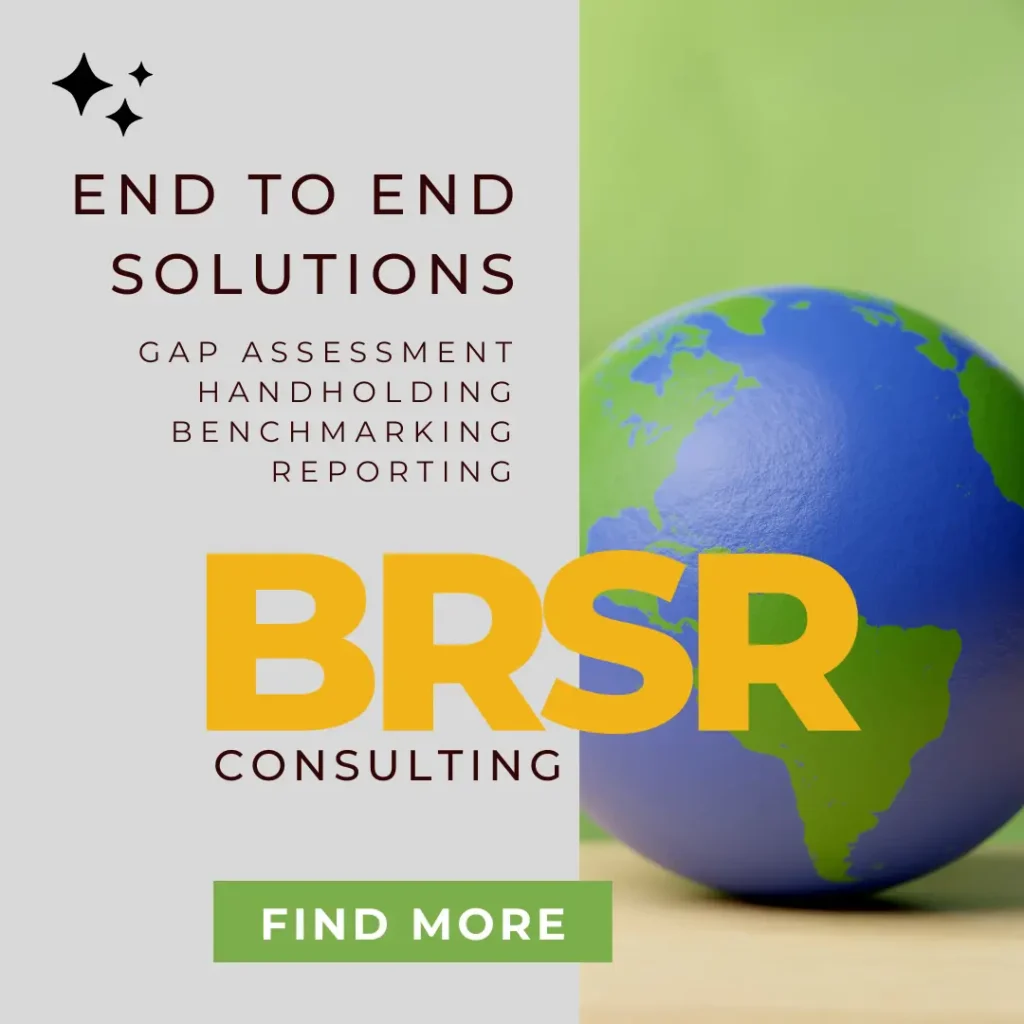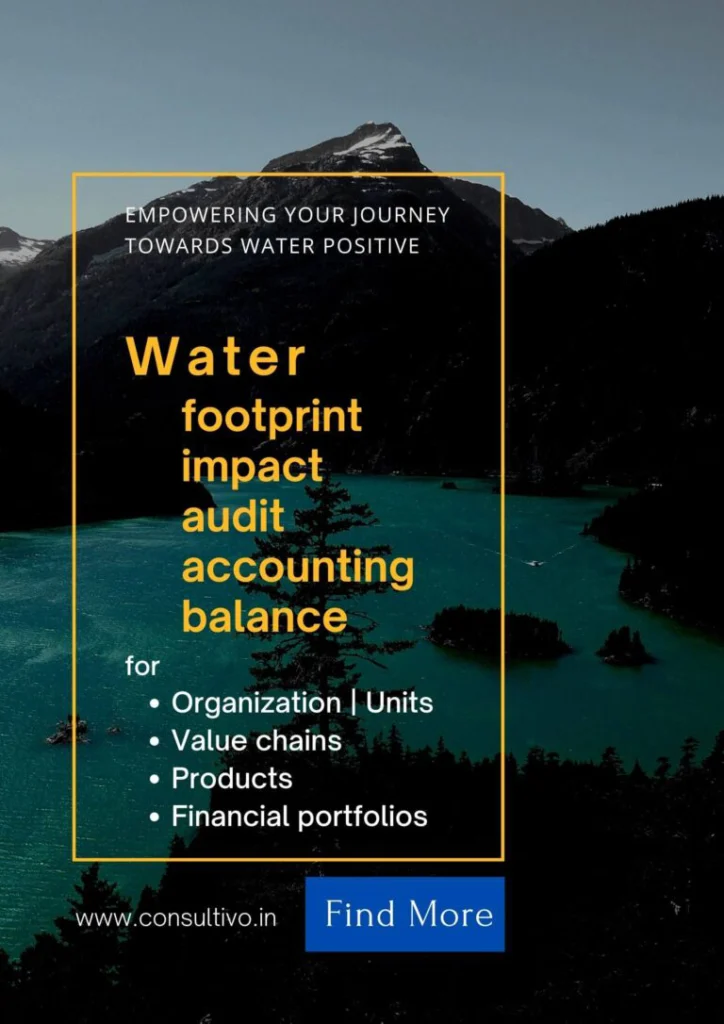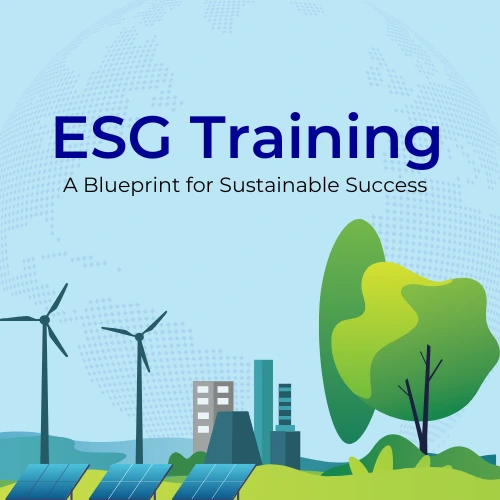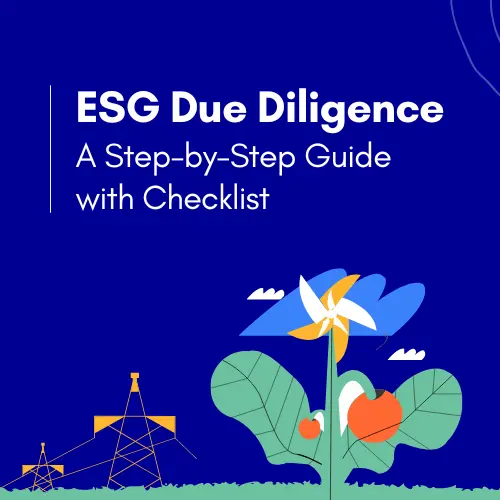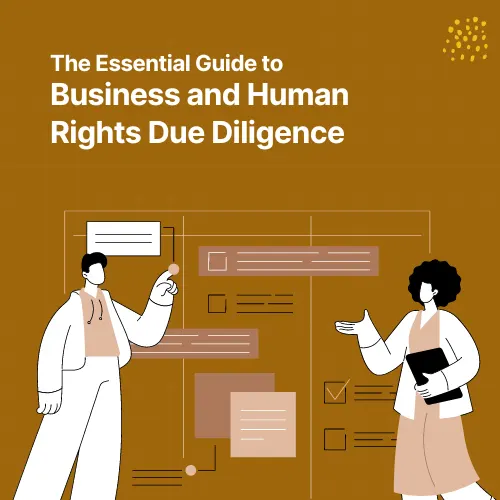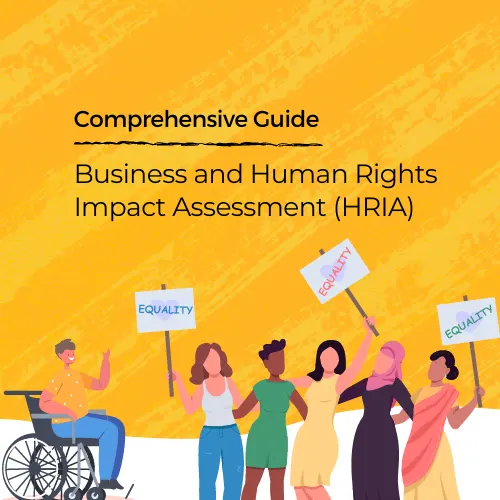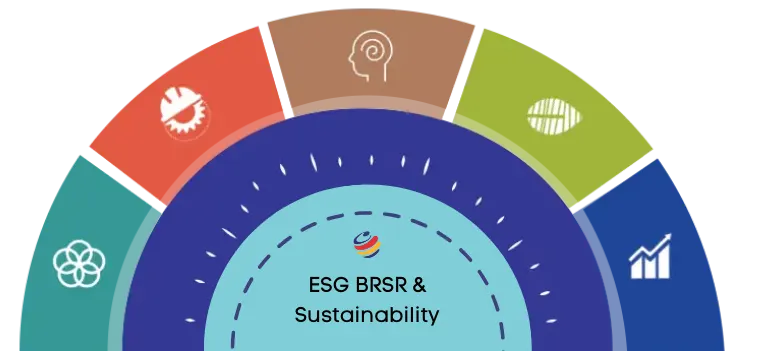
All you wanted to know about BRSR
Updated till December, 2024 – This is an era of growing emphasis on responsible business and corporate accountability. Organisations are increasingly expected to align their own and value chain operations with sustainability and ethical governance.
In response to this shift, the Securities and Exchange Board of India (SEBI) has introduced the Business Responsibility and Sustainability Reporting (BRSR) guidelines for listed companies. BRSR is a comprehensive framework aimed at promoting responsible business practices, focusing on environmental stewardship, social responsibility, and transparent governance.
In India, the new BRSR, in effect since 2023, is more closely aligned with globally accepted reporting frameworks like the GRI and TCFD. It requires the top 1,000 listed companies in India to respond to 140 questions, divided into 98 essential indicators (mandatory) and 42 leadership indicators (voluntary).
Being one of the leading ESG consulting firms, Consultivo technical team receives several queries; and the research team has listed many of them under this FAQ section.
What you will find here
What is BRSR or Business Responsibility and Sustainability Reporting?
BRSR full form is Business Responsibility and Sustainability Reporting. SEBI introduced the BRSR framework, mandating certain listed companies to disclose their ESG related information as a mandatory process. The BRSR framework aims to enhance transparency and encourage companies to adopt responsible and sustainable business practices.
At present, BRSR or Business Responsibility and Sustainability Reporting is mandated for the top 1000 listed companies (by market capitalisation) in India.
BRSR is not merely presenting the data collected, but an approach to drive an organization’s commitment to sustainability, and demonstrate it to the interested parties in a transparent manner.
The BRSR is an initiative towards ensuring that investors have access to standardized disclosures on ESG parameters. Access to relevant and comparable information will enable investors to identify and assess sustainability-related risks and opportunities of companies and make better investment decisions. At the same time, companies will be able to better demonstrate their sustainability objectives, position, and performance resulting in long-term value creation.
Overall, higher standards of ESG disclosures and transparency will help in attracting more capital and investment.
The BRSR seeks disclosures from listed entities on their performance against the nine principles of the ‘National Guidelines on Responsible Business Conduct’ (NGBRCs) and reporting under each principle is divided into essential and leadership indicators. The essential indicators are required to be reported on a mandatory basis while the reporting of leadership indicators is on a voluntary basis.
Listed entities should endeavor to report the leadership indicators also.
BRSR Value Chain Assessment-Reporting

How did BRSR come into existence?
Sustainability Reporting is an overview of a company’s economic, environmental and social impacts, caused by its business process. It ensures that the organisations consider their impacts on sustainability issues and enables them to be transparent about the risks and opportunities they face. Further, governmental regulation on environment, social and governance (ESG) issues have heightened to protect the rights of citizens and the environment.
SEBI was one of the early adopters of sustainability reporting for listed entities amongst its global peers. The filing of the BRR containing ESG (Environment, Social and Governance) disclosures was first introduced for listed entities in 2012.
In November 2018, the Ministry of Corporate Affairs (MCA) constituted a Committee on Business Responsibility Reporting for finalising Business Responsibility Reporting formats for listed and unlisted companies, based on the framework of the National Guidelines for Responsible Business Conduct’ (NGRBCs).
In August 2020, the Committee addressed various aspects and issues that could improve the quality and utility of disclosures and recommended Business Responsibility and Sustainability Reporting (BRSR) as an update on the existing Business Responsibility Reporting (BRR) to incorporate the current global practices in non-financial sustainability reporting based on the NGRBCs.
What is the Full Form of BRSR?
The full form of BRSR is Business Responsibility and Sustainability Rеporting. This is a rеporting framework notified by thе SEBI for stipulated listеd companies in India.
Applicability – Is BRSR Mandatory?
SEBI mandates the 1000 largest listеd companies by markеt capitalisation must mandatorily file BRSR rеports as part of the annual reports from FY 2022-23 onwards.
Further, as per SEBI Circular SEBI/HO/CFD/CFD-SEC-2/P/CIR/2023/122 dated 12th July 2023, the top 1000 listed entities by market capitalisation are required to make disclosures as per the updated BRSR format (which include the BRSR Core disclosure and assurance requirements, ESG disclosures for value chain, and assurance requirements), as follows:
| Financial Year | Applicability of BRSR Core |
| 2023-24 | Top 150 listed entities |
| 2024-25 | Top 250 listed entities |
| 2025-26 | Top 500 listed entities |
| 2026-27 | Top 1000 listed entities |
However, companies are encouraged to be early adopters of the BRSR, thus being at the forefront of sustainability reporting.
BRSR Submission Deadline
The BRSR report must be submitted by the 1,000 largest listed companies (by market capitalisation) as part of their annual reports to SEBI, starting from the financial year 2022-23.
Experience our End-to-End BRSR Solutions
Gap Assessment against BRSR Requirements BRSR Planning, Hand Holding and Implementation Support, Development of Monitoring Framework, BRSR Reporting. Benchmarking with Peer Industry PerformanceValue Chain Assessment

Basis of BRSR
Basis of reporting requirements under BRSR:
The base document behind which the BRSR has evolved is the extant BRR and National Guidelines on Responsible Business Conduct (NGRBC) principles, which itself emanates from Social Development Goals (SDGs).
SDGs by the United Nations are the backbone of the Principles of the NGRBC, each of the 9 Principles which forms the very root of the BRSR reporting has been aligned with the 17 SDGs.
What are the benefits of BRSR?
The MCA report objectifies BRSR to serve as “a single comprehensive source of non-financial sustainability information relevant to all business stakeholders – investors, shareholders, regulators, and public at large.”
BRSR Format or Framework
The Business Responsibility and Sustainability Reporting – BRSR framework or BRSR Format is a significant step towards promoting sustainability and ethical business practices in India. Mandated by the Ministry of Corporate Affairs (MCA), BRSR requires specific disclosures related to environmental, social, and governance (ESG) factors in a specific format known as BRSR Framework.
The BRSR framework is structured into three primary sections:
- General Disclosures: This section provides a foundational overview of the company, including its business activities, corporate structure, and legal compliance.
- Management and Process Disclosures: This section delves deeper into the company’s management processes and systems related to sustainability. It covers topics such as risk management, policy frameworks, and performance measurement.
- Principle-wise Performance Disclosures: This core section requires companies to report on their performance against the nine principles outlined in the National Guidelines on Responsible Business Conduct (NGRBC). These principles encompass a wide range of ESG issues, including:
- Ethical Business Conduct: Promoting integrity, transparency, and accountability.
- Product Responsibility: Ensuring product safety and sustainability.
- Employee Welfare: Respecting employee rights and promoting well-being.
- Stakeholder Engagement: Building strong relationships with stakeholders.
- Human Rights: Respecting and promoting human rights.
- Environmental Responsibility: Protecting the environment and conserving resources.
- Public Policy Engagement: Engaging responsibly in policy-making processes.
- Inclusive Growth: Promoting equitable development and social inclusion.
- Customer Value: Providing value to customers in a responsible manner.
By adhering to the BRSR framework or BRSR format, companies can demonstrate their commitment to sustainability, enhance their reputation, and attract responsible investors.
Get Certified: BRSR Certification Courses through Expert-Led BRSR Training – Online Tutor Led – E-Learning – Onsite
To strengthen the BRSR framework and improve the reliability of ESG disclosures, SEBI introduced BRSR Core in 2023. Being a more focused subset, BRSR Core requires companies to report their performance on nine key ESG attributes, each with specific performance indicators.
This approach is more stringent than the original BRSR, as it mandates that disclosures under BRSR Core be supported by reasonable assurance.
Are unlisted companies covered under BRSR requirements?
As per the MCA committee recommendation, the reporting requirement may be extended by MCA to unlisted companies based on specified thresholds of turnover or paid-up capital.
Further, the committee recommends that on a voluntary basis, smaller unlisted companies below this threshold limit may adopt a lite version of the format.
Two formats for disclosures are available; a comprehensive format for listed companies; and a lite version for unlisted companies, in case it is extended to them.
Navigating SEBI’s BRSR Guidelines: A Deeper Dive
SEBI’s BRSR guidelines provide a comprehensive framework for Indian companies to report on their sustainability performance.
These guidelines align with global best practices, ensuring that Indian companies can effectively communicate their ESG efforts to both domestic and international stakeholders.
Key aspects of SEBI‘s BRSR guidelines include:
Interoperability with Global Standards: The guidelines encourage companies to adopt elements from globally recognised standards like GRI and SASB. This promotes consistency and comparability across different jurisdictions.
Two-Tiered Reporting: Companies are required to report on both essential and leadership indicators. Essential indicators cover fundamental ESG aspects, while leadership indicators delve into more advanced sustainability practices.
Quantitative Disclosures: SEBI mandates the disclosure of quantitative data on environmental performance, including energy consumption, greenhouse gas emissions, water usage, and waste generation.
Social Impact Reporting: Companies are required to provide information on social aspects such as employee welfare, diversity and inclusion, human rights, and community engagement.
Flexibility for Industry-Specific Disclosures: The guidelines recognise that not all disclosures may be relevant to every industry. Companies can explain the non-applicability of certain disclosures.
Clear and Concise Reporting: Companies are expected to provide clear, concise, and accurate information, supported by relevant documentation.
By adhering to these guidelines, Indian companies can effectively communicate their sustainability journey, build trust with stakeholders, and contribute to a more sustainable future.
Unlocking BRSR Reasonable Assurance: Explained For Every Business Leader
What are the steps to be followed by aspiring companies?
Companies who are mandated to comply with SEBI BRSR reporting requirements need to invest in necessary mechanisms which could help in the following aspects:
Understanding BRSR
- Familiarize Yourself: Gain a deep understanding of the BRSR framework, its principles, and the specific requirements for your industry.
- Identify Material Issues: Determine the key ESG issues relevant to your business operations and value chain. These issues should be material to your stakeholders and have a significant impact on your business.
Data Gathering and Analysis
- Data Collection: Gather relevant data on your company’s environmental, social, and governance performance. This may include data on energy consumption, greenhouse gas emissions, waste generation, employee diversity and inclusion, human rights practices, and community engagement.
- Data Quality Assurance: Ensure the accuracy, completeness, and reliability of the collected data. Implement robust data management practices to maintain data integrity.
Assessing and Reporting
- Performance Assessment: Evaluate your company’s ESG performance against the BRSR principles and the identified material issues. Identify areas of strength and areas for improvement.
- BRSR Report Preparation: Prepare a comprehensive BRSR report that includes both quantitative and qualitative information. The report should be clear, concise, and easy to understand.
- External Assurance: Consider obtaining external assurance on your BRSR report to enhance credibility and transparency.
Implementation and Continuous Improvement
- Set Targets and KPIs: Establish specific, measurable, achievable, relevant, and time-bound (SMART) targets to address identified material issues.
- Implement Sustainability Initiatives: Develop and implement ESG strategies and initiatives to improve your company’s ESG/BRSR performance.
- Monitor and Evaluate: Continuously monitor your progress towards your sustainability goals and evaluate the effectiveness of your initiatives.
- Stakeholder Engagement: Engage with stakeholders, including investors, employees, customers, and suppliers, to understand their expectations and incorporate their feedback into your sustainability strategy.
By following these steps, aspiring companies can effectively implement the BRSR framework, enhance their sustainability performance, and build a strong reputation as a responsible corporate citizen.
As an Independent Sustainability and ESG Consulting Firm, Consultivo offers complete Communication and Disclosure solutions for Corporate Reporting that includes GRI Based Sustainability Reporting, SEBI Business Responsibility and Sustainability Report, ESG Reporting, CSR Reporting, Sustainability Communication Report and other Custom Built Reports.
International movements on ESG Reporting
Governments of several countries have introduced disclosures on sustainability reporting. Countries like Denmark, South Africa, China, Malaysia, and Philippines require certain companies to make disclosures in relation to their non-financial performance across ESG aspects.
EU Non-Financial Reporting Directive is one of the most significant EU-wide legislative initiatives to promote sustainability reporting. Climate change related reporting is prevalent in Australia, Mexico, USA, and in France. The Modern Slavery Act, first enacted by the UK in 2015 and more recently by Australia, asks each company to report on modern slavery not just in its operations but also in its global supply chains, thereby including many SMEs in emerging markets.
International investors with global investment portfolios are increasingly calling for high quality, transparent, reliable, and comparable reporting by companies on climate and other environmental, social and governance (ESG) matters.
SASB Standards
SASB Standards help organisations disclose sustainability-related risks and opportunities that could impact their cash flows, access to finance, or cost of capital over the short, medium, or long term. These standards provide a framework for reporting on issues that are material to the financial performance of a business.
Focusing on 77 industries, SASB identifies the most relevant sustainability factors for investors, enabling companies to report on the key issues that influence decision-making and long-term value creation.
As of August 2022, the International Sustainability Standards Board (ISSB) of the IFRS Foundation assumed responsibility for the SASB Standards. The ISSB has committed to maintain, enhance and evolve the SASB Standards and encourages preparers and investors to continue to use the SASB Standards.
The SASB Standards play an important role in the first two IFRS Sustainability Disclosure Standards, IFRS S1 General Requirements for Sustainability-related Disclosures and IFRS S2 Climate-related Disclosures.
The World Economic Forum has also released a set of universal ESG metrics and disclosures that companies can report on. These metrics and disclosures are aligned with the UN SDGs: Principles of governance, planet, people, and prosperity.
Compatibility of BRSR with other reporting frameworks
Companies preparing and disclosing sustainability reports based on internationally accepted reporting frameworks such as GRI, SASB, TCFD, are allowed to cross refer the disclosures made under such framework to the disclosures sought under BRSR. Companies may leverage existing disclosures to avoid repetitions.
Mandatory reporting under BRSR shall not restrict companies from making extensive disclosures in their annual reports voluntarily through integrated reporting or other sustainability report frameworks.

Let's discuss
Share this post
About the author
CEO at Consultivo
Saikat Basu is a long time sustainability and risk management professional and entrepreneur. He is having a diversified exposure to various management practices in the areas of strategic leadership, organisation excellence, financial management and people engagement.
He has worked intensively with 200+ national and international standards on responsible business. He is a member of several sustainability (SHE Award, Environmental Excellence, Social Impact) award program design & jury committee. He is a passionate blogger and visiting faculty in academics.
Related insights
View more in Impact Stories | Blogs | Knowledge Bank | News and Events

